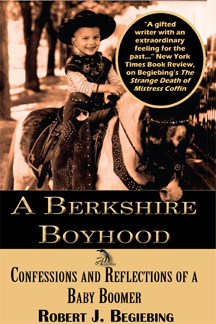MANCHESTER, N.H., May 14, 2014 (GLOBE NEWSWIRE) -- One of the primary sources for the new memoir by Robert J. Begiebing—"A Berkshire Boyhood: Confessions and Reflections of a Baby Boomer" (Anaphora Press)—were the scraps of memory that an unhappy teenager jotted into his notebooks during a time when he was supposed to be paying attention in class.
He and his three siblings had been just uprooted from their home in Williamstown, Massachusetts, and dropped into southern California on behalf of a new engineering job for their father—a man who was an electrical engineer and Navy veteran by day, a philandering alcoholic and gifted jazz trumpeter at night.
The elder Begiebing was perhaps ill-suited for marriage, but particularly so to his tight-laced Catholic wife. Young Bob loved jazz as well as his father, wanted to be a musician—and was just finding out that he didn't have the talent for it. He was also discovering how much he missed, and had loved, the Berkshire hills of his childhood. Those notebook jottings were his first attempt to makes sense of it all.
"I knew I'd lost something terribly significant to me," Begiebing said. "That powerful landscape was part of it, but I knew there was much more to unearth and decipher."
The book begins ahead of itself, in 1992, as Begiebing and his brother sift their father's ashes into the Pacific waters off Monterey. This is in the midst of the lifetime that it took to come to terms with that loss. A self-described "dunderhead" in the classroom until he began those surreptitious jottings in high school, Begiebing found that he did have a gift—not for music, but for the written word.
In adulthood he left California to return to New England to build a career as a brilliant academic and one of our most accomplished historical novelists. His seven books of fiction and nonfiction include a lauded trilogy of novels spanning two hundred years of New England history.
The first, "The Strange Death of Mistress Coffin" (Algonquin, 1991, 1996) was a Main Selection of the Mystery and Literary Guild Book Clubs and has been optioned for a film. The second, "The Adventures of Allegra Fullerton" (University Press of New England, 1999) earned the praise of reviewers for The New York Times, The Los Angeles Times, The Times of London, and many others. And "Rebecca Wentworth's Distraction" (UPNE, 2003) won the Langum Prize for historical fiction.
Bebiebing has also penned two volumes of criticism on twentieth century fiction, edited an historical anthology of nature writing, and is the founding director of Southern New Hampshire University's up-and-coming low-residency MFA program in fiction and nonfiction.
Begiebing's historical fiction, though, has been nothing but timely in its exploration of themes having to do with sex, intimacy, coming of age, class, creative talent, and clashes between cultural paradigms. And these are all united in a first foray into narrative nonfiction that focuses only on those years in the Berkshires.
"That time in anyone's life is so powerful and so formative," Begiebing. "And it just so happens that it was a very formative time our country's life as well."
Indeed the book is as much a record of a generation—make that two generations—as it is of a boyhood and a family. Begiebing's contending parents were members of what he chooses to call not the Greatest Generation, but rather the Tragic Generation. "My generation ridiculed their parents' desperate quest for stability; we saw it as conformity," Begiebing writes. "But we didn't understand in the late sixties that their desperation was born of their own tragic losses."
"A Berkshire Boyhood" records the opening of that generational chasm at the same time that it describes other chasms: between Williamstown's blue collar families—such as the Begiebings—and the town's university elite; between these two flawed parents; and between a boy's innocence and all the varieties of loss that come to separate him from that.
"And yet this is also a very joyful book, full of the vivid pleasures of that place and time," said ecojournalist Richard Adams Carey, the assistant director of SNHU's MFA writing program. "When 'The Strange Death of Mistress Coffin' came out, The New York Times hailed Bob as 'a gifted writer with an extraordinary feeling for the past.' This book affirms that this holds true for his own past as well—and his generation's."
Photos accompanying this release are available at:

